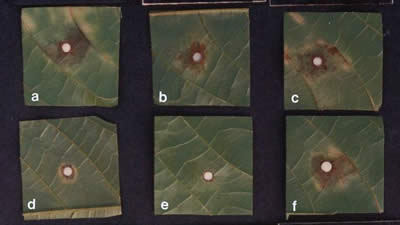GORTT Projects
Government of the Republic of Trinidad and Tobago Projects
Improvement of resistance to Black Pod disease in Trinidad Selected Hybrids (TSH)
A collaborative project between CRC (as CRU) and MFP (formerly MALMR/MFPLMR), Improvement of resistance to Black Pod disease in Trinidad Selected Hybrids (TSH) , was approved by the GORTT to begin in 2007.
The aim of this project is to complement the desirable traits (low pod index, resistance to Witches’ Broom disease and Ceratocystis wilt, fine flavour and early bearing) of some promising Trinidad Selected Hybrid cultivars, bred by the local Ministry of Food Production, with resistance to Black Pod disease. Selected improved progeny, particularly those with superior flavour potential, from CRC’s germplasm enhancement programme are being used to achieve this.
The start of the project was delayed due to the illness and passing of David Iwaro, however David wrote a detailed workplan while in hospital, and pollinations for the breeding design began in 2008.

Crosses were made with promising TSH cultivars (low pod index, fine flavor, early bearing, tolerance to witches' broom disease and Ceratocystis wilt) and progeny from CRC Black Pod (BP) resistance germplasm enhancement programme (1998). Cocoa Research Centre evaluated the BP resistance of the progenies generated by the aforementioned 2008 breeding programme.
In September, 2009, Dr. Surendra Surujdeo-Maharaj assumed responsibility for the project with assistance from Annelle Holder-John and technical staff at CRC. Good progress has been made in the intervening years and close to 5000 progeny are under field evaluation by MFPLMA staff.
Development of a nutraceutical and flavour profiling system of cocoa beans in Trinidad and Tobago
The project entitled “Development of a nutraceutical and flavour profiling system of cocoa beans in Trinidad and Tobago”, funded by the GORTT Research Development Fund, is a joint project between CRC (Dr. D.A. Sukha) and the Department of Chemistry (Dr. I. Chang-Yen), UWI. The purpose is to acquire in-house expertise to perform analyses of flavour chemistry in cocoa, and involves the training of two post-graduate students from the Department of Chemistry. (They are jointly supervised by Dr. Chang-Yen, Dr. Sukha and Frances Bekele and are expected to submit their MPhil theses by December, 2011.) Distinctive flavour volatiles and polyphenol contents in cocoa samples have been identified.
Investigation and Prevention of Heavy Metal and Ochratoxin A Contamination of Cocoa in Trinidad and Tobago
This project was funded by the then Ministry of Agriculture, Lands & Marine Resources (MALMR) (now the Ministry of Food Production Land & Marine Affairs (MFPLMA) between 2006 and 2010. The Project Team consists of Dr. I. Chang-Yen, Department of Chemistry; F.L. Bekele, Cocoa Research Centre; Dr. I. Bekele, Dept. of Food Production; Prof. L.A. Wilson, Dr. B. Sukha, Analytical Chemist, MALMR (until December 2007), Lisa Harrynanan, Analytical Chemist, MFPLMA (until January, 2011), Prof. N. Ahmad and Prof. E.J. Duncan of The UWI.
The research was undertaken by two PhD. students, Gideon Ramtahal and Jillian Roberts. The results of this project will be of great benefit to the local cocoa industry in the following areas:
- Determination of heavy metal and Ochratoxin A content in cocoa from specific producing geographical areas, and under varying production and storage practices;
- Facilitation of the certification of safety of locally produced cocoa to assure its future preferential marketability;
- Improvements in the processing and storage of cocoa beans through recommendations on how to minimize heavy metal and Ochratoxin A contamination issued to farmers, processors and exporters;
- Mapping of the mineral distributions in cocoa-growing regions throughout the country to facilitate effective land utilisation for agriculture and urban development through the application of GIS. Identification of mineral deficiencies in soils will enable appropriate supplementation for enhanced productivity.
Ms. Roberts has submitted her dissertation for examination and Mr. Ramtahal is due to submit his shortly. They presented their results in July at the Caribbean Food Crop Society meeting in Barbados. The results have been very significant, and follow-up studies have already been initiated.

















